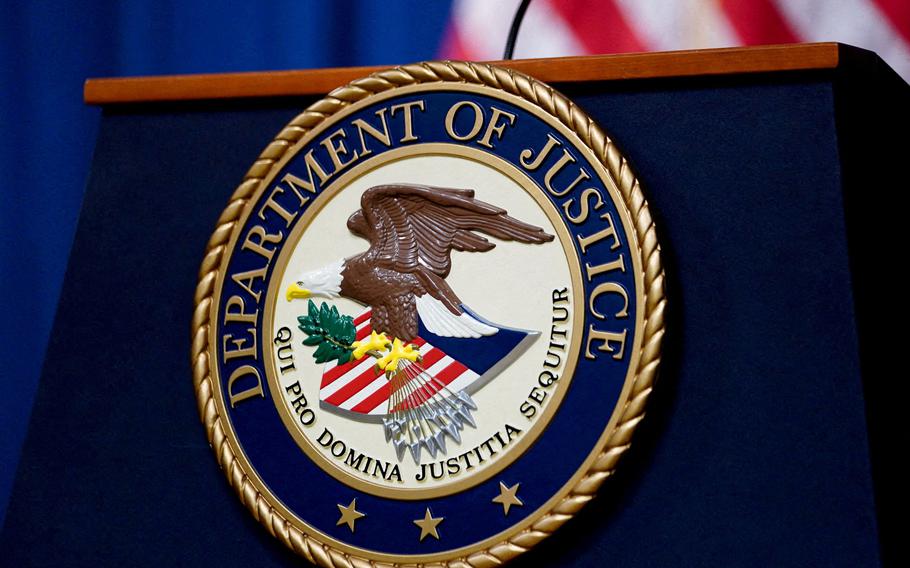
The seal of the Justice Department on a lectern in the department's headquarters briefing room in 2023. (Kevin Lamarque)
In the modern battlespace, we must confront threats in the “Gray Zone,” where America’s rivals, with a growing range of indirect and non-military tools at their disposal, are seeking ways to achieve relative gains without triggering escalation.
Threats cover the entire spectrum of conflict — land, sea, air, space, cyber, and a potentially new domain: artificial intelligence. Confronting them requires situational awareness of all pillars of national power—diplomatic, information, military and economic—and how all these factors interact to ensure we guard our national security.
This month, the American Security Project issued a report with a stark warning about one such threat, specifically how the unregulated practice of third-party litigation financing (TPLF) could become a potent tool for foreign adversaries looking to exploit America’s open society and judicial system for strategic gain. Their report is the latest — and perhaps clearest — alarm bell yet indicating the threat that TPLF could pose to national security.
For those of us who have spent our careers defending our nation, the implications are clear: America is leaving open another backdoor that hostile nations could potentially exploit to weaken our technological edge, compromise military readiness, and undermine the very innovation that underpins its dominance on the battlefield.
TPLF is a relatively new arrangement in the legal space that allows outside investors — including foreign entities — to fund lawsuits in exchange for a share of any court awards or pre-trial settlements. Since its arrival in the U.S. legal system, TPLF has exploded into a multibillion-dollar industry. In 2021 alone, more than $10 billion flowed from investors to law firms, much of it used to fund mass tort cases and the extensive media campaigns that draw in claimants. From 2017 to 2021, for example, nearly $7 billion was spent on legal advertising — often with vague disclaimers and no indication of who is paying for the lawsuits or why.
While hedge funds and private equity firms have flocked to the practice for its potentially lucrative returns, it appears that foreign actors may also be quietly entering the field. The full scope of this involvement has been difficult to discern though, because under current law there is no requirement for third-party funders to disclose their identity, role, or strategic interests.
That presents a national security risk that America can no longer afford to ignore. When foreign financiers back litigation —particularly cases involving high-stakes patent infringement or intellectual property theft — they can gain access to confidential information that would otherwise be out of reach. And if the litigation were to target American firms working in artificial intelligence, semiconductors, aerospace or biotech, the consequences would extend far beyond the courtroom.
China, in particular, has already demonstrated its willingness to use legal and economic warfare to weaken the United States. They have been exceptionally adept at stealing U.S. intellectual property through espionage, cyber and academic engagement, resulting in a dramatic leap forward in military capabilities. Beijing has shifted from buying and modifying Russian military equipment to increasingly copying U.S. equipment, such as the J20 Chengdu — F35 Lightning II, Y20 Kunpeng — C17, and the Z20 Harbin — UH-60 Black Hawk. Allowing the People’s Liberation Army to now anonymously bankroll litigation inside America’s own court system could offer them further access to some of the country’s most sensitive technologies. This isn’t just economic espionage — it’s a direct threat to military preparedness.
While some defenders of TPLF argue that it provides access to justice, national security must come first. No litigation finance arrangement — foreign or domestic — should operate outside the sunlight of disclosure when technologies important to America’s military and defense could potentially be involved.
The good news is that lawmakers are beginning to take this threat seriously. In April, Rep. Ben Cline of Virginia introduced H.R. 2675, the Protecting Our Courts from Foreign Manipulation Act of 2025. This critical legislation would require all named parties in a suit, or their counsel of record, to disclose any foreign investment to the courts, opposing counsel and the Department of Justice, providing much-needed transparency that is lacking under current rules. It would also prohibit direct investments from foreign governments and sovereign wealth funds—an additional essential safeguard.
The U.S. Chamber of Commerce has rightly praised the bill, noting that it would “help limit the ability of foreign governments to weaponize our court system against U.S. national and economic security interests.” But Congress must move quickly. It has long been known that America’s adversaries seek asymmetric means to undermine its power—from cyberattacks to disinformation campaigns. The courtroom should not become their next front.
Safeguarding national security in the 21st century requires vigilance across every domain, but in America’s courtrooms as well. This is not a partisan issue. Every American — regardless of political affiliation — should be concerned that foreign actors can use the legal system to gain an edge in the next war before the first shot is fired. It’s time to close the loophole and expand transparency for the American people, secure the courts, and defend America’s technological advantage.
Sergio de la Peña a retired U.S. Army colonel, is the former deputy assistant secretary of defense for Western Hemisphere affairs.